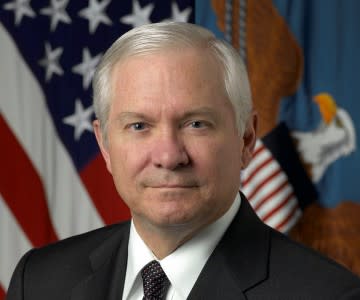Secretary Gates’ book ignites another Washington debate
Advance reviews of former Defense Secretary Robert M. Gates’ book has Washington talking about public policy and the people who make it, including some pointed words about the Obama administration and harsher comments about Congress.
Robert M. Gates
Gates appears at the National Constitution Center on January 17 at a public event to promote the book, in an event we will also broadcast live on the Internet.
Link: Info about attending the event
Gates, who is also a past recipient of the Liberty Medal, will take questions and talk about the book, “Duty: Memoirs of a Secretary at War,” amid a sea of publicity surrounding comments that include candid talk about his time in Washington.
The book doesn’t go on sale until next week, but reviews in The Washington Post and The New York Times—and the reaction to them—dominated the political discussion on Wednesday.
So until the public has a chance to read the full book, the debate is centering on the reviews, some excerpts and comments by Gates in an editorial.
In his appearance here, the former head of the Pentagon will discuss how he juggled multiple wars abroad as well as the political realities at home. His talk also will focus on the wars in Iraq and Afghanistan, national security, “Don’t Ask, Don’t Tell,” and the mission to capture and kill Osama Bin Laden.
He became the 22nd Secretary of Defense in 2006, and Gates was the only Defense Secretary in U.S. history to be asked to remain in that office by a newly elected President.
His bipartisan record included serving eight presidents after joining the Central Intelligence Agency in 1966. Gates spent nearly 27 years as an intelligence professional, and was the only career officer in CIA’s history to rise from entry-level employee to Director.
With that bipartisan record, Gates’ public thoughts and contents usually get attention.
A review from The New York Times’ Thom Shanker focuses on Gates’ accounts of disagreements over policy in Afghanistan.
Greg Jaffe’s review for the Washington Post also covers some other major issues that Gates discusses, including his conflicts with a Congress he calls “hypocritical and obtuse,” but it also mostly focuses on Afghanistan.
Gates himself elaborated on some of these points in a Wall Street Journal editorial on Tuesday, in an essay adapted from the book.
He openly talks about his disagreements with the White House over policy issues and concerns about domestic policy influencing foreign policy. But his harshest words are for Congress, and not the Executive Branch.
“Such difficulties within the executive branch were nothing compared with the pain of dealing with Congress,” says Gates.
“Congress is best viewed from a distance—the farther the better—because up close, it is truly ugly. I saw most of Congress as uncivil, incompetent at fulfilling their basic constitutional responsibilities (such as timely appropriations), micromanagerial, parochial, hypocritical, egotistical, thin-skinned and prone to put self (and re-election) before country.”
He was also dismayed by the tone of congressional hearings.
“It was as though most members were in a permanent state of outrage or suffered from some sort of mental duress that warranted confinement or at least treatment for anger management,” Gates said.
Also lost in the publicity over the Obama comments is Gates’ constant devotion and respect for the military.
“For too many people—including defense ‘experts,’ members of Congress, executive branch officials and ordinary citizens—war has become a kind of videogame or action movie: bloodless, painless and odorless. But my years at the Pentagon left me even more skeptical of systems analysis, computer models, game theories or doctrines that suggest that war is anything other than tragic, inefficient and uncertain,” he said in the Journal editorial.
Recent Constitution Daily Stories
Can the nation’s capital really be moved to Nebraska?
Aereo case heads to a behind-doors Supreme Court session


